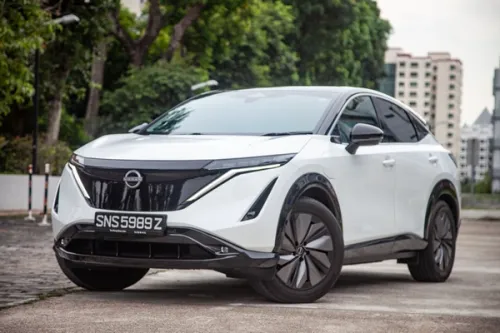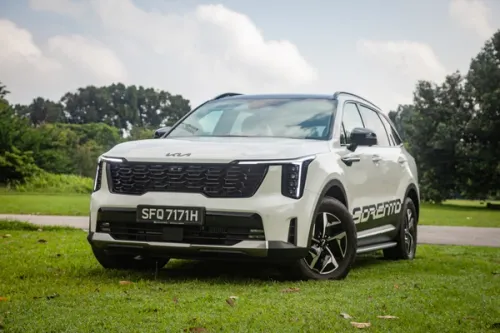Is Singapore (EV)er-ready?
With less than 50 kilometres driving distance from one end of Singapore to the other, geographically, the little red dot is seemingly perfect for EVs: One full charge of the vehicle could power the end-to-end drive. The small nation-state has seen the potential that EVs will bring and has started test-bedding EVs from 2010. But the uptake of private EVs in Singapore is still in its infancy stages as it has and is still playing catch-up with the other nations. Will Singapore truly be ready to embrace the future of EVs?

During the 2017 Geneva Motor Show, Singaporean start-up Vanda Electrics, with the support of William Advanced Engineering, released the fastest electric hypercar – the Dendrobium. Its debut has garnered great interest in the automotive industry as car enthusiasts eagerly wait for the production of the cutting-edge Dendrobium.
This adds them to the list of several other carmakers that have already announced their intentions to increase their efforts in the production of electric vehicles (EV): Aston Martin will roll out its electric RapidE in 2019, Nissan’s Infiniti will debut its first electric vehicle in 2021, Ford Motors announced its move into manufacturing electric cars, with plans to introduce as many as 24 hybrid or electric cars by 2022, and General Motors would release 20 different electric models by the end of 2023. Welcome to the rise of EVs!
Besides the increasing supply of electric cars in the global market, several countries and cities have also been looking into the adoption of electric cars for the sake of reducing pollution and improving air quality in light of realising the goals put out at the Paris Climate Conference. Electric cars are sought after, as they are better for the environment than petrol-fuelled cars that release harmful carbon emissions.
Most of the early adopters of EVs worldwide are the result of the government’s push for a burgeoning electric car industry. In Norway, the advantageous tax system encourages consumers to purchase EVs rather than petrol-fuelled ones. China’s government also implemented rebates and credits that drive up the sales of EVs, and lawmakers are legislating that EVs and hybrid cars must make up 10% of each carmaker’s sales, and this figure will increase to 12% by 2020. Similarly, the South Koreans’ administration focuses its efforts to increase subsidies and establish the necessary infrastructure, especially in Jeju where they aim to have 100% EVs by 2030. Conversely, in Georgia, the scrapping of the $5,000 tax credit and replacing it with a $200 registration fee has reduced the sales of EVs by about 80%.
With less than 50 kilometres driving distance from one end of Singapore to the other, geographically, the little red dot is seemingly perfect for EVs: One full charge of the vehicle could power the end-to-end drive. The small nation-state has seen the potential that EVs will bring and has started test-bedding EVs from 2010.
In 2014, Singapore announced its plans to trial an EV car-sharing programme that will include infrastructural support as well as initiating up to 1,000 EVs. Three years later in 2017, BlueSG started its operation with 30 island-wide charging points. In that same year, Land Transport Authority (LTA) awarded the tender to purchase 50 diesel hybrid buses to Volvo East Asia (Pte) Ltd. And just last week, Grab and Hyundai announced their tie up to develop a platform for mobility service that includes promoting the usage of the Hyundai Ioniq Electric. As a whole, Singapore has indeed put in a lot more effort to increase the absolute numbers of EVs in Singapore.
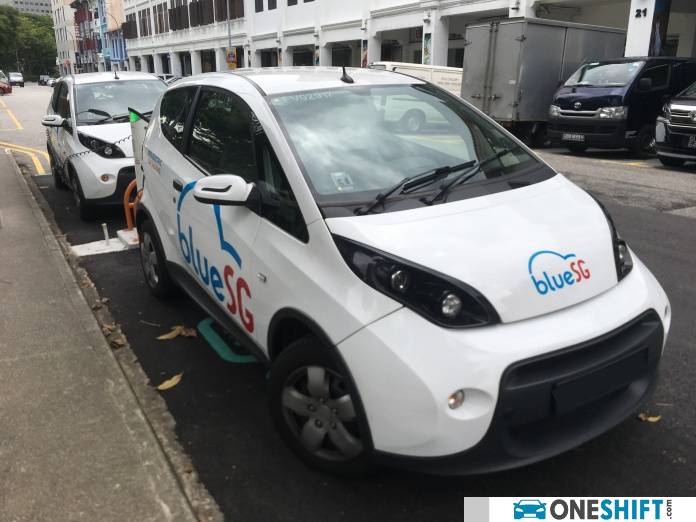
Yet, all these supports were mainly for car-sharing and public transportation in Singapore. What about residents owning electric or even hybrid cars? The uptake of private EVs in Singapore is still in its infancy stages as it has and is still playing catch-up with the other nations.
Owning a car is already extremely expensive in Singapore, but to own an electric car, one must definitely have very deep pockets. This can be seen in the controversial case of the very first Tesla Model S import, where the owner was slapped with an additional $15,000 surcharge. (Fortunately, the second and third Tesla Model S imports were granted rebates of $10,000 and $15,000.)
Things have started to change a little after that incident to recognise differences between emissions from electric and petrol-fuelled cars. The new implementation of the Vehicular Emissions Scheme (VES), announced during Budget 2017 that penalises high carbon dioxide emissions in favour of vehicles that give off low emissions, is but one small step in the right direction.
But is it really enough? Why would consumers in Singapore purchase EVs?
Price-sensitive Singaporeans look for the best bang-for-buck vehicles, which often are not the EVs. For starters, EVs have higher upfront costs and are less readily available as compared to the petrol-fuelled ones. The range of electric cars in Singapore is still much smaller and many of them are expensive EVs from the big brand names. Electric cars like the BMW i3 costs about $190,000, the mid-tier all-new Hyundai Ioniq Electric is approximately $150,000, and you’ll need roughly $120,000 to purchase the cheaper alternative, the Nissan Leaf Electric. In comparison, petrol-fuelled cars like the 1.3 Honda Jazz costs only around $95,000. Even with the new VES rebates, electric cars still costs more and that would possibly deter many, who do not have cash on hand, from purchasing EVs.
Furthermore, the 10-year Certificate of Entitlement (COE) that Singapore car owners have to pay would mean that it is much harder to recoup the savings that the operation of the electric cars would provide in the long run. As such, consumers may not see the EVs as worthwhile purchases.
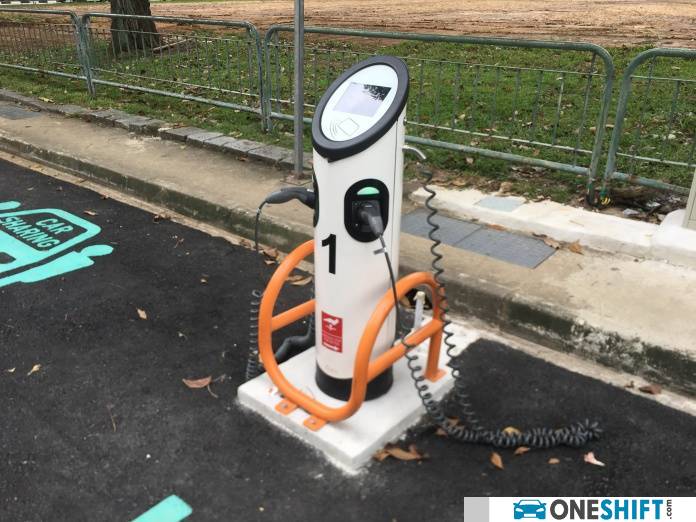
Even if the higher upfront costs are not a concern, the inconvenience of having to find a charging station may also steer people away from the purchase. The government, through the tie-up with BlueSG, will be installing 2,000 EV charging points, of which 400 will be made available for public usage. But this is still currently in motion and these 400 charging points have yet to be established.
With the current infrastructure, not only will one have to drive 20 minutes or so to look for a EV charging station, it takes around 12 hours to fully charge an electric car which may be far too long for busy Singapore residents who often work long hours.
Besides, information about purchasing EV cars, where to find the charging points, and how to maintain these cars in the Singapore context are still quite lacking in comparison those of the petrol-fuelled cars.
Credits: Google Maps, Disclaimer: There’s probably more charging points than what’s shown in the map but again, this just proves that information is not yet readily available on the web.
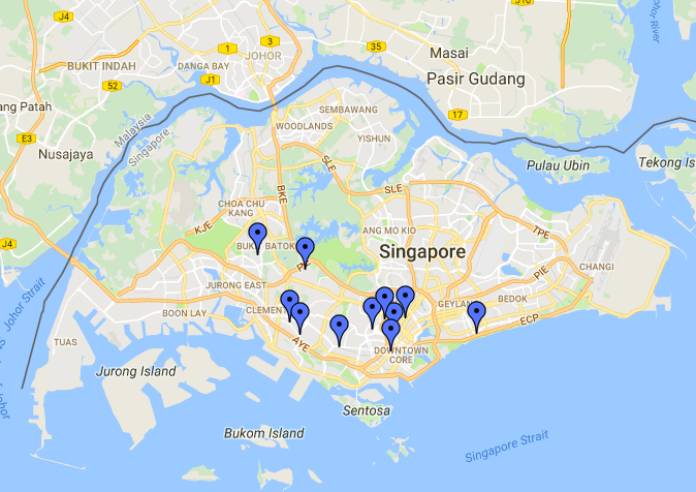
With all these disadvantages of owning an EV in Singapore, it is no wonder that the uptake of private EVs is still relatively low.
The only way forward perhaps, is for those who can, to purchase EVs to drive up the demand such that it compels businesses and the government to improve the EV infrastructure in Singapore. Going back to Economics 101, the increase in demand for EVs will help drive up the demand for EV-related products, services, and infrastructure which would then help to speed up the supply, creating a more vibrant EV industry in Singapore. For instance, businesses like Greenlots that provide EV charging points and solutions will find it more profitable to expand their services. The EV Association of Singapore could also possibly help to engage the public as well as car enthusiasts to help shape preferences for electric cars.
More information, greater convenience, and possibly lower costs need to be in motion in order to make great shifts in the perspectives of consumers in Singapore towards purchasing EVs. So, if you are looking for a new car this year, why not consider purchasing an EV this time round to do your part in improving the vibrancy of the EV industry in Singapore?
As the automotive industry watches the Dendrobium become a reality, it also waits to see if Singapore will truly be ready to embrace the future of an EV world!
Credits:

- Convenient and Hassle-Free
- Consumer Protection
Transparent Process
With No Obligation


Get the Best Price for your used car
from 500+ dealers in 24 hours
